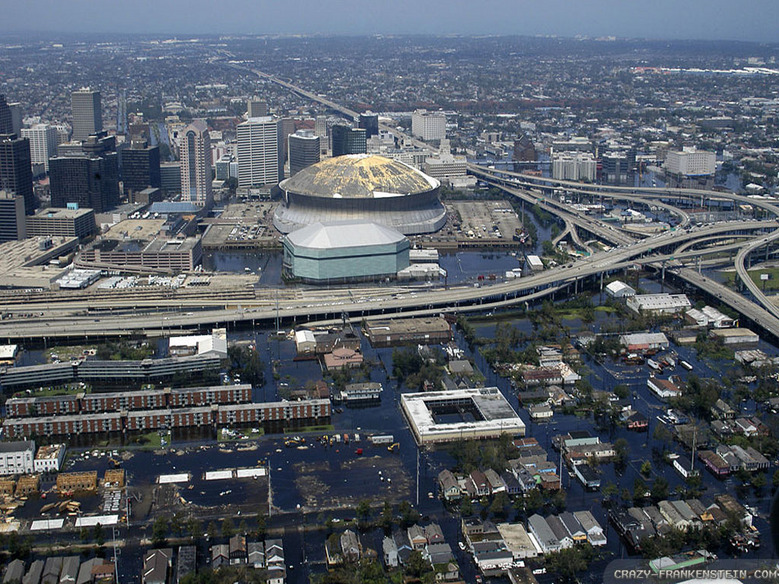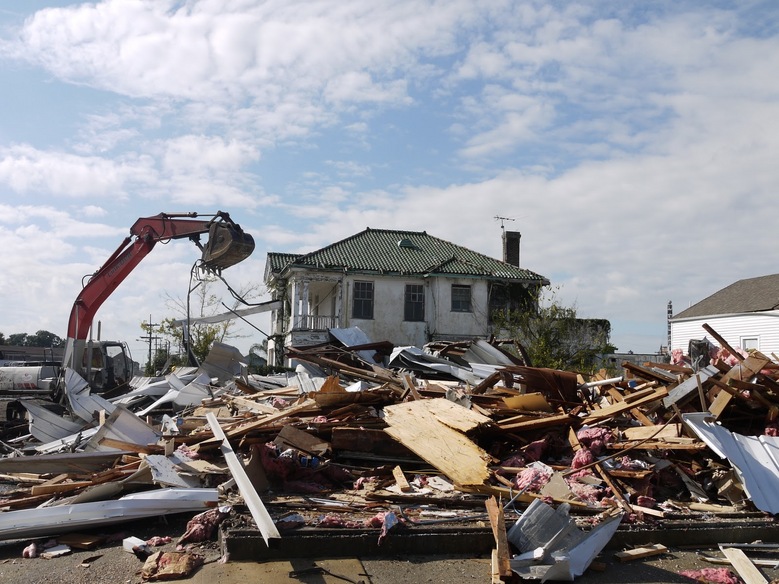Katrina
It is now the end of January of 2006. I have just moved back in with my brother at the house on Music Street in New Orleans. The city has been irrevocably changed since the levees failed during Hurricane Katrina. I, like many others have spent several months not quite knowing where home is. It has been five months since the storm. Almost the entire region of Gentilly is wrecked with unimaginable flood damage and almost completely devoid of citizens. Steve’s house lies within the lucky two blocks along Gentilly Boulevard in which the water didn’t reach the interior of the houses. His small area can now, for the most part, be referred to as Gentilly Island. Five months have passed and still, just the drive to the one open SavACenter near Lake Pontchartrain quickly reminds you how all encompassing the damage of this tragedy has been to this fair city. House after house, block after block, all just ruined; the rusty water marks leaving their greasy prints on the wood and brick and stucco, deeper and deeper on every home as you approach the lake; all gutted with nobody there. All of these people have mortgages and businesses and are facing possible financial ruin. I know it’s been said to death, but until you personally see it for yourself, you can’t quite realize the scope of this disaster. Even being here, it is still hard to comprehend. Entire neighborhoods are just destroyed; and the vast majority of the inhabitants may never be able to come back to what they know as home.
New Orleans as it was is teetering on the brink; you could rightfully say that is has tipped over. Yes, the French Quarter survived. The business district and Uptown and most of the suburban areas are intact. But what has always made New Orleans most unique, besides its colorful history and bountiful culture, is the spirit of its people; proud, crazy, sincere, spiritual, humorous, benevolent.
I have seen, heard and read, as I hope you have, most of the stories which have been reported in the media about the situation in New Orleans. I was fortunate enough to have been able to evacuate the storm which so many people endured and persevered through with courage and heroism. There are a wealth of these accounts which have yet to be published. The real stories of this majority of people rarely make it to the news. We all saw the tragedy unfold on live television: the chaos, the looting, the lawlessness. The world got a close up look at the reality of poverty and racial disparity in this country. America was somehow surprised. We also witnessed the flaws of our system of leadership from top to bottom. Many people in and outside of New Orleans did and still do ridicule the way the emergency was handled, in some cases rightfully so, but not that I would wish this on anyone, it makes me wonder how their leaders and citizens would do in the same situation. This is an unprecedented catastrophic event.
There’s no simple solution. There are no easy answers. New Orleans will never be the same. There are many hard facts that most of the people of this city will have to face; namely, moving to another place; perhaps to higher ground farther up or down river, hopefully connected by light rail. That means leaving the neighborhood that you have grown up in and in which may hold so many memories and so much community. To people from New Orleans, this is heartbreaking.
I hope I’m not alone in thinking that the American government needs to step up to the plate. New Orleans was flooded not only by a hurricane, but by the failure of the levee system that was designed by the U.S. Army Corps of Engineers. It’s so disheartening to me, sometimes angering, that even after five months following this crisis, the government is still debating what and how and who should do what and when and how and who’s going to pay for what. We as a country obviously have enough money to secure our interests internationally. Why are we having to beg for our own survival and why does it seem like no one’s listening?
It is now the end of January of 2006. I have just moved back in with my brother at the house on Music Street in New Orleans. The city has been irrevocably changed since the levees failed during Hurricane Katrina. I, like many others have spent several months not quite knowing where home is. It has been five months since the storm. Almost the entire region of Gentilly is wrecked with unimaginable flood damage and almost completely devoid of citizens. Steve’s house lies within the lucky two blocks along Gentilly Boulevard in which the water didn’t reach the interior of the houses. His small area can now, for the most part, be referred to as Gentilly Island. Five months have passed and still, just the drive to the one open SavACenter near Lake Pontchartrain quickly reminds you how all encompassing the damage of this tragedy has been to this fair city. House after house, block after block, all just ruined; the rusty water marks leaving their greasy prints on the wood and brick and stucco, deeper and deeper on every home as you approach the lake; all gutted with nobody there. All of these people have mortgages and businesses and are facing possible financial ruin. I know it’s been said to death, but until you personally see it for yourself, you can’t quite realize the scope of this disaster. Even being here, it is still hard to comprehend. Entire neighborhoods are just destroyed; and the vast majority of the inhabitants may never be able to come back to what they know as home.
New Orleans as it was is teetering on the brink; you could rightfully say that is has tipped over. Yes, the French Quarter survived. The business district and Uptown and most of the suburban areas are intact. But what has always made New Orleans most unique, besides its colorful history and bountiful culture, is the spirit of its people; proud, crazy, sincere, spiritual, humorous, benevolent.
I have seen, heard and read, as I hope you have, most of the stories which have been reported in the media about the situation in New Orleans. I was fortunate enough to have been able to evacuate the storm which so many people endured and persevered through with courage and heroism. There are a wealth of these accounts which have yet to be published. The real stories of this majority of people rarely make it to the news. We all saw the tragedy unfold on live television: the chaos, the looting, the lawlessness. The world got a close up look at the reality of poverty and racial disparity in this country. America was somehow surprised. We also witnessed the flaws of our system of leadership from top to bottom. Many people in and outside of New Orleans did and still do ridicule the way the emergency was handled, in some cases rightfully so, but not that I would wish this on anyone, it makes me wonder how their leaders and citizens would do in the same situation. This is an unprecedented catastrophic event.
There’s no simple solution. There are no easy answers. New Orleans will never be the same. There are many hard facts that most of the people of this city will have to face; namely, moving to another place; perhaps to higher ground farther up or down river, hopefully connected by light rail. That means leaving the neighborhood that you have grown up in and in which may hold so many memories and so much community. To people from New Orleans, this is heartbreaking.
I hope I’m not alone in thinking that the American government needs to step up to the plate. New Orleans was flooded not only by a hurricane, but by the failure of the levee system that was designed by the U.S. Army Corps of Engineers. It’s so disheartening to me, sometimes angering, that even after five months following this crisis, the government is still debating what and how and who should do what and when and how and who’s going to pay for what. We as a country obviously have enough money to secure our interests internationally. Why are we having to beg for our own survival and why does it seem like no one’s listening?


